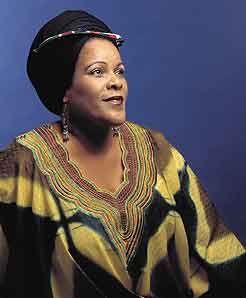|
|
 |
 |
 |
|
 |
 |

|
Artists her age have either given up on music or trying to make a comeback on the music career. But not this 36-year-old KwaMashu, Durban born gospel diva. Truth be told - Deborah Fraser is a superstar who patiently waited for her time to come - and now it's her time.
However, Debs, as she is populary known in music circles at home and in
the United States of America by artists of repute, does not want to be
regarded as the ''superstar''. ''People make me a superstar and treat me that way. But I'm not a superstar. I just regard myself as an ordinary God-fearing person'', says Deborah with a smile.
When she released her ground-breaking debut album Abanye Bayombona, some cynics in the music industry dismissed it, saying it would not go far.
It went on to become a multi-platinum seller in a year - a difficult feat for countless gospel musicians. Audited figures were at more than 100 000 before the release of the second album Udlalile Ngabantu.
The release of this album bear witness to Deborah’s growth, musically. Universal Music also released her international album which is entitled Born Again. The album Born Again and other tracks from Abanye Bayombona were released in the United Kingdom, produced by Deborah's young producer extraZordinaire and the shy Sipho Mbhele.
Instrumentation:
vocals
Genre:
gospel / spiritual
|
|
|
"The overseas release (Born Again) means a lot to me. It shows that my talent is respected even by people I've never worked with or met before.They cant just release my album if they doubted my selling ability. It also means that I'm going somewhere in life and musically speaking that it is - I'm coming out of the dark," says Deborah. The album will also be played at local UK clubs, as remixed of Born Again (Uma Kungenxa) and We're Born Again (Abanye Bayombona) will be released specifically for this market.
But the road to recording the previous album (Abanye Bayombona) was not
so rosy for the down-to-earth Deborah. In 1996, she has lost her son Mbuso
after birth. She dedicated Uma Kungenxa to him. She also dedicated Mangihamba, from the debut album (Abanye Bayombona) to the late diva Wendy Mseleku, Moses Taiwa Molelekwa, her sister Promise, brother Daram, and other artists who passed away prematurely.
In the new album Udlalile Ngabantu, Deborah dedicates Ethuneni Lam to her
cousin Colleen who passed away in July 2002. Deborah played the same song at her funeral in KwaMashu. The mourners heard the song for the first time even before it was finished on the album.
The track Mama Wam' is dedicated to her mother Catherine Tshabalala-Fraser who is always supporting her through thick and thin. "This song is not only dedicated to my mother alone - it's also dedicated to all the mothers in the world," says Deborah.
The touching song Masimbonge (Let's Praise Him) is dedicated to her son
three-year-old Nkosana, who nearly drowned in a pool while she was visiting her doctor. She says about the incident: "I thank God for saving his life.
I'll never stop thanking God for saving my child's life."
Deborah, who possesses an angelic voice is the type of gospel singer the
country and the world has been waiting for in many years.
A veteran musician with international experience, Deborah has worked with
respected American producer and singer Quincy Jones, Bebe Wynans and John Secada. She has also backed Yvonne Chaka Chaka, Lucky Dube, Cindy Lauper, Ladysmith Black Mambazo and gospel musician Rebecca Malope.
The former Ohlange High school pupil came to Johannesburg in 1985 to seek for greener pastures in the recording industry. She started out working with the respected composer, singer and gospel producer Mthunzi Namba who also hails from KZN.
Later, she featured in the album Mbulali Wami where she did lead
vocals. She sang alongside pop diva Brenda Fassie, Lundi and Peter Mokoena in this double platinum Sello ''Chicco'' Twala produced album.
She started singing at school and went on to be featured by international
artists though she was not yet a household name. Even Kanda Bongo Man,
famous for Kwasa Kwasa dance featured Deborah in his album Balobi.
Deborah, who comes from a family with a strong religious backround can
sing any type of music - from gospel, pop to mbaqanga - any genre you can
think of.
She came to Johannesburg when singers like Yvonne Chaka Chaka, Brenda
Fassie, Tshidi Leloka, Faith Kekana, Ebony, and the group Joy were
dominating the musical scene. Those days women were in a powerful position to influence trends and were commanding a big following among music fans.
With such a big number of top female stars, Deborah was a backing singer
for countless musicians like Yvonne, Brenda, Lucky Dube and many others. Together with contemporaries like Stella Khumalo, Mandisa Dlanga and
Faith Kekana - they were the busiest session musicians and in demand to
back other musicians in the country. The quartert worked with every musician who needed to quality voices in their productions. They ended up being on almost every album produced in the country for the past 17 years.
When the exiles returned home in the early 90's, Deborah and her friends
toured around the world with former exiles Miriam Makeba, Hugh Masekela,
Letta Mbulu and Caiphus Semenya.
|
|
|
|
|